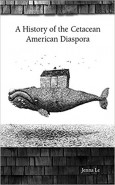
Book Review: A History of the Cetacean American Diaspora by Jenna Le

A History of the Cetacean American Diaspora
Poems by Jenna Le
Anchor & Plume, February 2016
$15.00; 85 pp.
ISBN-13: 978-0990685661
Reviewed by Paul David Adkins
“O = 2(A – I) and I = arcsin (n sin(R)/na, where na ≈ 1.003 is the index of refraction of air” seems complex. However, this formula simply conveys how lenticular prints display both Jesus and, as a viewer passes, Mary. Jenna Le’s second full-length collection A History of the Cetacean American Diaspora treats the reader to this feat, combining precise order and a pitch-perfect ear.
Not since Joan Houlihan’s 2009 The Us has a poet so eloquently captured dislocation and survival. The Us’ syntactical irregularities reflect culture permanently facing disaster: “Morning, and as sun is born from dark / ours father took the track to where / the red deer ran . . .” Le’s poetry, however, is linguistically exact in portraying immigrant experiences. And still, America despises Vietnamese refugees.
A History contains three sections, fashioned after Genesis 1:21 describing whales, “living creatures,” and waterfowl. Using this triptych-like format, Le creates the sense of an image appearing, disappearing, and transforming, a shift inherent to lenticular prints. Section 1 opens with a humpback in the title poem. The speaker observes the creature as “he up-flounces out of water,” and seconds later, “drops back down with force.”
The opening poem in the second section, “Minnesota,” states, “West Wind, I need you now. Here, no one shores / me up; I have no teacher, no translator, / no one to stop me from stumbling into craters.” Later, “Che Bap” encapsulates hope and surrender: “. . . a scourge of squirrels / wiped out Father’s crop. He and Mother shrugged.” As Section 2 closes, Le admits, “‘Seems you’re not human, after all.’”
In the third section, Le compares whales and waterfowl in “Tidal Breathing:”
Beneath the surface gloss
of his brown breastplate,
his puffed-out chest
harbors two separate fistfuls
of cold oxygen.
His lungs are more evolved, more efficient
than our human lungs . . .
There is a sense of shifting here, a blending of two otherwise incompatible creatures. Le’s comparison draws the reader into their commonality subtly, as the lenticular easily transforms from one image to the next.
History’s close immerses the reader. During Hurricane Sandy, Le observes, “a dove was shaken out of the sky, / the way a woman shakes the knots / out of a long silk scarf.” Suddenly the picture is clear. Le’s mastery of the narrative arc has led the reader on a journey encompassing whales, birds, and all in between. And that arc is so smooth that we are convinced these creatures are interchangeable, one and the same as we view them in passing: swimming, diving, straining and rising to fly.
Paul David Adkins served in the US Army for 21 years, three months, and 18 days. Lit Riot Press published his three poetry collections: La Dona, La Llorona; Flying Over Baghdad with Sylvia Plath; and Operational Terms and Graphics.

I love this